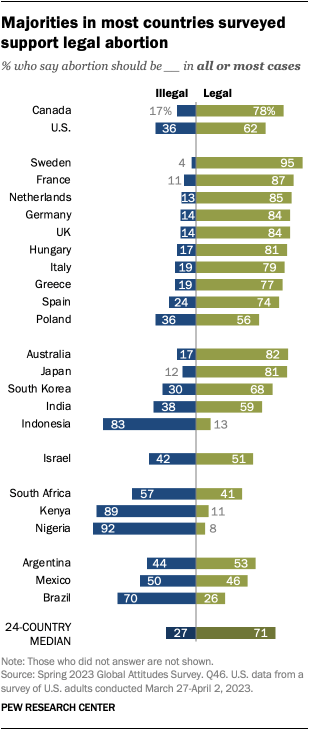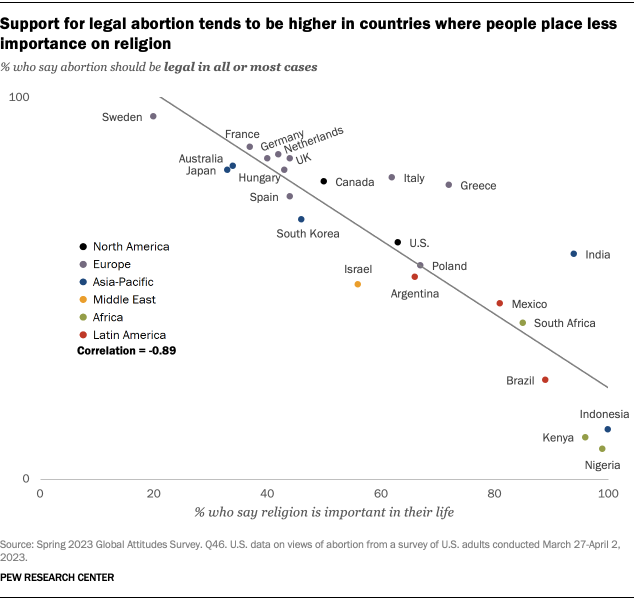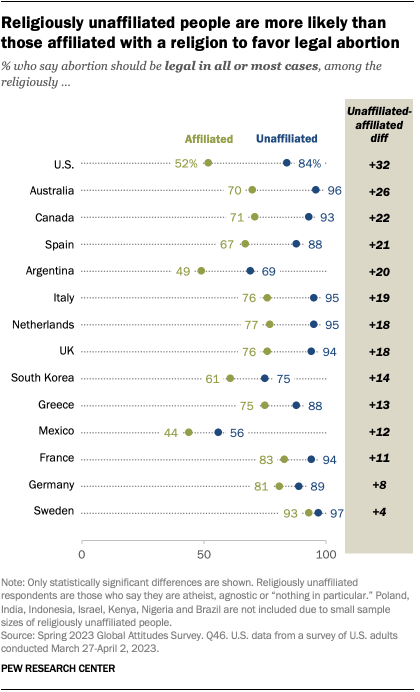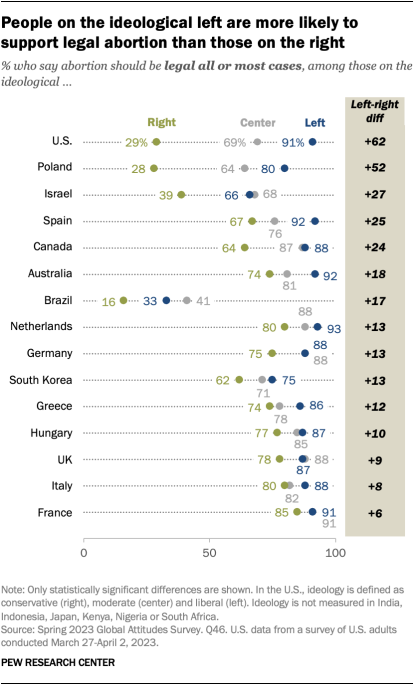Majorities in most of the 24 nations surveyed by Pew Research Center this spring say abortion should be legal in all or most cases. But attitudes differ widely across countries – and often within them. Religiously unaffiliated adults, people on the ideological left and women are more likely to support legal abortion.
This analysis focuses on public opinion of abortion in 24 countries in North America, Europe, the Middle East, the Asia-Pacific, sub-Saharan Africa and Latin America.
For non-U.S. data, this report draws on nationally representative surveys of 27,285 adults conducted from Feb. 20 to May 22, 2023. All surveys were conducted over the phone with adults in Canada, France, Germany, Greece, Italy, Japan, the Netherlands, South Korea, Spain, Sweden and the United Kingdom. Surveys were conducted face-to-face in Hungary, Poland, India, Indonesia, Israel, Kenya, Nigeria, South Africa, Argentina, Brazil and Mexico. In Australia, we used a mixed-mode probability-based online panel.
In the United States, data on views of abortion comes from a survey of 5,079 U.S. adults conducted from March 27 to April 2, 2023. Everyone who took part in this survey is a member of the Center’s American Trends Panel (ATP), an online survey panel that is recruited through national, random sampling of residential addresses. This way nearly all U.S. adults have a chance of selection. The survey is weighted to be representative of the U.S. adult population by gender, race, ethnicity, partisan affiliation, education and other categories. Read more about the ATP’s methodology.
Here are the questions used for the analysis, along with responses, and the survey methodology.

A median of 71% of adults across the 24 countries surveyed believe abortion should be legal in all or most cases, while a median of 27% believe it should be illegal.
In the United States, where a Supreme Court decision ended the constitutional right to abortion last year, 62% of adults say abortion should be legal in all or most cases. U.S. support for legal abortion has not changed in recent years.
In Europe, there is widespread agreement that abortion should be legal. In nearly every European country surveyed, at least 75% of adults hold this view, including roughly 25% or more who say it should be legal in all cases. Swedes are especially supportive: 95% say it should be legal in all or most cases, including 66% who say it should be legal in all cases.
Poland stands out among the European countries surveyed for its residents’ more restrictive views, at least compared with the views of other Europeans. Over half of Poles (56%) say abortion should be legal in all or most cases, while 36% say it should be illegal in all or most cases.
Attitudes about legal abortion vary in the Asia-Pacific region. Majorities say it should be legal in all or most cases in Australia, India, Japan and South Korea. But in Indonesia, 83% of adults say it should be illegal in all or most cases.
In Israel, 51% of adults say abortion should be legal in all or most cases, while 42% say it should be illegal in all or most cases.
In all three African countries surveyed – Kenya, Nigeria and South Africa – majorities say abortion should be illegal in all or most cases, including 89% of adults in Kenya and 92% in Nigeria.
In South America, views about legal abortion are divided in Argentina and Mexico. But in Brazil, seven-in-ten adults say abortion should be illegal in all or most cases.
Abortion rules are more restrictive in countries where support for legal abortion tends to be lower. Abortions in Brazil, Indonesia and Nigeria are only permitted when a woman’s life is at risk, according to the Center for Reproductive Rights. In Israel, Kenya and Poland, abortion is permitted to preserve a woman’s health. Most other countries surveyed have more permissive regulations that allow abortions up to a specific point during the pregnancy.
Compared with previous Pew Research Center surveys in Europe, India and Latin America, more people now say that abortion should be legal in all or most cases in many countries.
Importance of religion and attitudes toward abortion
Attitudes toward abortion are strongly tied to how important people say religion is in their lives. In countries where a greater share of people say religion is at least somewhat important to them, much smaller shares think abortion should be legal.
For example, 99% of Nigerians say religion is important in their lives and only 8% say abortion should be legal in all or most cases. On the opposite end of the spectrum, 20% of Swedes see religion as important and 95% support legal abortion. People in India are outliers: 94% of Indians view religion as important, but 59% also favor legal abortion.

How religious affiliation, country GDP relate to abortion views
Economic development plays a role in this relationship, too. In countries with lower gross domestic product per capita, people tend to be more religious and have more restrictive attitudes about abortion.

But the U.S. stands apart in this regard: Among the high-income countries surveyed, Americans have the highest per capita GDP but are among the most likely to say religion is important to them. They are also among the least likely of the high-income countries to say abortion should be legal in all or most cases.
Religious affiliation is also an important factor when considering views of abortion within individual countries. On balance, adults who are religiously unaffiliated – self-identifying as atheist, agnostic or “nothing in particular” – are more likely to say abortion should be legal in all or most cases than those who identify with a religion.
This difference is largest in the U.S., where 84% of religiously unaffiliated adults say abortion should be legal in all or most cases, compared with 52% of religiously affiliated Americans. Of course, differences also exist among religiously affiliated Americans, too: White evangelical Protestants are the least likely to favor legal abortion.
In countries where there are two dominant religions and negligible shares of religiously unaffiliated adults, there are often divides between the dominant religions.
Take Israel, for example, where 99% of adults affiliate with some religion. In Israel, 56% of Jewish adults say abortion should be legal in all or most cases, compared with 23% of Muslims. And 89% of Jews who describe themselves as Hiloni (“secular”) favor legal abortion, while only 12% of Haredi (“ultra-orthodox”) or Dati (“religious”) Jews agree. Masorti (“traditional”) Jews fall in between, with 58% favoring legal abortion.
Views differ by religion in Nigeria, too, even as the vast majority of Nigerians oppose legal abortion. One-in-ten Nigerian Christians support legal abortion in all or most cases, compared with just 3% of Nigerian Muslims.
Differences in views by political ideology

In 15 of the 18 countries where Pew Research Center measures political ideology on a left-right scale, those on the left are more likely than those on the right to say abortion should be legal in all or most cases.
Again, Americans are the most divided in their views: 91% of liberals support legal abortion, compared with 29% of conservatives.
Opinions by gender
Gender also plays a role in views of abortion, though these differences are not as large or widespread as ideological and religious differences.
In seven countries surveyed this year – Australia, Israel, Japan, South Korea, Sweden, the UK and the U.S. – women are significantly more likely than men to say abortion should be legal in all or most cases.
In an additional six countries in Europe and North America, women are more likely than men to say abortion should be legal in all cases. In Hungary, Poland, India, Indonesia, and in all the African and Latin American countries surveyed, men and women have more similar views on abortion.
Note: Here are the questions used for the analysis, along with responses, and the survey methodology.

